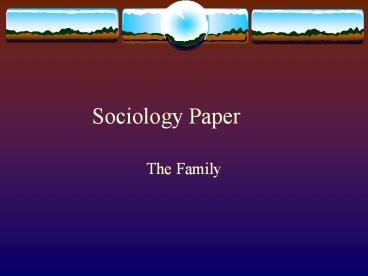Sociology Paper
1 / 4
Title: Sociology Paper
1
Sociology Paper
- The Family
2
1a) Explain what is meant by the term Urbanisation
- There is usually a clue in the text to give you a
good idea of what it means if you dont already.
In this text it says related CHANGES such as
Urbanisation Changes is a key word as it
indicates to you what Urbanisation means. - Your answer should look a bit like this
- Urbanisation is a term that describes the
changes that result in an increased population in
cities. It could refer to the movement of people
from smaller locations or the countryside and
into cities.
3
1b) Identify two characteristics of the
privatised family.
- You will need to have done your revision but
also the text helps you by giving you one. with
industrialisation the family became a unit of
consumption only - One characteristic of a privatised family is
that due to changes in society, the family no
longer needs to rely on wider members of the
family, so it does not have such significant
links with wider kin. A further reason is that
such a family is only a unit of consumption and
there is no need to produce anymore. - You do not HAVE to explain each one, but it may
help you to do so briefly so the examiner
understands what you are saying.
4
1d) Identify and explain two criticisms of the
functionalist view of the relationship between
the family and industrialisation.
- One of the main functionalist views about family
and Industrialisation is that Industrialisation
resulted in the nuclear family being more common.
This view suggests that due to Industrialisation
people no longer lived together as large family
units, but lived as a closer knit nuclear family.
This view has been criticised by the historian
Peter Laslett who found through his research that
in fact, between 1564 and 1821 10 of households
lived with wider members of their family. These
figures were remarkably similar to households in
Britain in 1981, indicating that the
functionalist view is not true.Further to this,
research by Michael Anderson has suggested that
in fact, contrary to the functionalist view, the
early stages of industrialisation actually
increased the extended family. Anderson argues
that as this was a time of widespread poverty and
high death rates, people relied on their extended
family for care and support. For example, many
people relied on living with relatives to save
money on rent.































